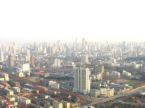Nanjing
 From Conservapedia - Reading time: 1 min
From Conservapedia - Reading time: 1 min
| Nanjing | |||||||||
|---|---|---|---|---|---|---|---|---|---|

| |||||||||
| Chinese | 南京 | ||||||||
| Postal | Nanking | ||||||||
| Literal meaning | southern capital | ||||||||
| |||||||||
Nanjing, also Nanking, is a city in eastern China, situated on the south bank of the Yangtse River about 200 miles west of Shanghai. Nanjing was capital of China during part of the Ming dynasty, and, renamed Tianjing (Heavenly Capital) was the capital and main base area of the Taiping kings during the Taiping Rebellion of the 1850s and 1860s. It was the capital of the KMT-led Republic from 1928 to 1937. In 1937, Nanjing was occupied by the invading Japanese army and subjected to a horrific extended period of murder, rape, looting and destruction which is known as the Rape of Nanjing. The city was subsequently capital of the puppet government of Wang Jingwei. Following the defeat of Japan in 1945 Nanjing again served as the Chinese capital until the fall of the Republic in 1949 and the establishment of the communist regime, which moved the capital back to Beijing.
The many historical monuments in and around the city include the Mausoleum of Sun Yat-sen in the Purple Hills, and the dramatic 6.7 km long double-deck road/rail Yangtse Bridge, completed by Chinese engineers after the sudden withdrawal of Soviet experts by Kruschchev, and opened in 1968.
The cloth known as Nankeen gets its name from Nanjing.
 KSF
KSF